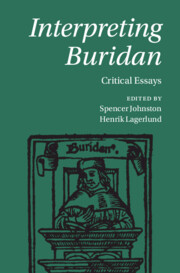Book contents
- Interpreting Buridan
- Interpreting Buridan
- Copyright page
- Dedication
- Contents
- Contributors
- Preface
- Abbreviations
- Introduction
- 1 The Philosopher as Arts Master
- 2 Principles in Buridan’s Logic of Consequences
- 3 Buridan on Paradox
- 4 Modality and Temporality in Buridan’s Logic
- 5 A Paradigm Change within Medieval Philosophy
- 6 Buridan’s Internalism
- 7 John Buridan on the Ontological Status of Artifacts
- 8 John Buridan on Final Causality
- 9 Female Physiology in John Buridan’s Quaestiones de secretis mulierum
- 10 Buridan on the Value of Emotions
- 11 Buridan on Happiness and the Good Life
- References
- Index
11 - Buridan on Happiness and the Good Life
Published online by Cambridge University Press: 01 February 2024
- Interpreting Buridan
- Interpreting Buridan
- Copyright page
- Dedication
- Contents
- Contributors
- Preface
- Abbreviations
- Introduction
- 1 The Philosopher as Arts Master
- 2 Principles in Buridan’s Logic of Consequences
- 3 Buridan on Paradox
- 4 Modality and Temporality in Buridan’s Logic
- 5 A Paradigm Change within Medieval Philosophy
- 6 Buridan’s Internalism
- 7 John Buridan on the Ontological Status of Artifacts
- 8 John Buridan on Final Causality
- 9 Female Physiology in John Buridan’s Quaestiones de secretis mulierum
- 10 Buridan on the Value of Emotions
- 11 Buridan on Happiness and the Good Life
- References
- Index
Summary
Ethical Aristotelianism, with happiness at its core, is enjoying a resurgence. The revival of this view has been driven in large part by historically minded philosophers, who believe that the best versions of this general outlook were developed many centuries ago by some of our astute philosophical forebears. John Buridan shares a similar approach. Like these historically minded philosophers today, he both attempts to reconstruct others’ views – especially those of Aristotle and Seneca – and attempts to respond to potential concerns that one might have through a sensitive and creative development of those inherited views. This sort of creative development is on full display in Buridan’s work on happiness and the good life, as he clarifies, expands, and reshapes Aristotle’s basic conception of happiness.
This essay reconstructs the account that results. It begins with Buridan’s account of happiness understood as the best single human good. It then turns to Buridan’s account of happiness understood as the best collection of human goods, which he takes to be unqualified human happiness. Finally, since unqualified happiness is extremely demanding and thus exceedingly rare, the essay considers varieties of happiness in various restricted senses that Buridan seems to countenance, namely, being happy for a time, being happy within the confines of one’s non-ideal situation in life, and being happy in a domain of one’s life. The author hopes that even in this short span it will become clear that Buridan is among those astute philosophical forebears worth taking seriously as an ethicist, especially for those invested in the project of Ethical Aristotelianism.
- Type
- Chapter
- Information
- Interpreting BuridanCritical Essays, pp. 199 - 228Publisher: Cambridge University PressPrint publication year: 2024
- 1
- Cited by

